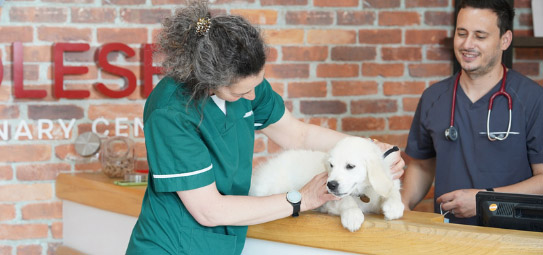
How stress presents itself in guinea pigs, hamsters and other small furries
May 7, 2023
Guinea pigs, rabbits, hamsters, gerbils, otherwise known as ‘small furries’ are common pets in many UK homes. These cute little creatures can be bundles of fun and soon become a loved part of the family, but did you know that your small furry can suffer from anxiety just like a dog or cat? The signs may not always be obvious, but as a responsible pet owner it helps to know what to look out for.
This month includes Pet Anxiety Week so the nursing team at Molesey Vets in Surrey want to give you the lowdown on how signs of anxiety present in small furries and the best course of action to take if you notice them.
Tell-tale signs of anxiety in small furries
The most common signs of anxiety appear in similar ways across most types of small furry pet, including guinea pigs, hamsters, gerbils and rabbits, and tend to be behavioural or body language changes. According to Molesey Vets’ Head Nurse Heather, these include:
- Repetitive behaviour such as circling
- Biting at the cage bars
- Overgrooming
- Baring teeth and excessive vocalisation
- Sitting hunched
- Biting owners when being handled – not all small furries like to be picked up
- Looking nervous/tense/jumpy with bulging eyes (guinea pigs and rabbits)
- Frequent yawning and tossing of head (guinea pigs)
- Freezing/not moving/shaking/vibrating (guinea pigs and rabbits)
- Aggression and irritation towards other rabbits or guinea pigs
- Thumping their feet (rabbits)
The following signs below can also indicate anxiety but can in some cases also be caused by a medical problem. If you notice these signs, we advise you to call us to make an appointment at our 4 Park Road, East Molesey, Surrey, KT8 9LE practice on 0208 979 1384 to get your pet checked. These are:
- Spending more time sleeping and/or hiding
- Hair loss and bald patches
- Changes in eating/drinking habits including loss of appetite
- Weight loss
Contact us if you spot these signs
What to do if you spot signs of anxiety
1. Update their living space
In many cases you can help your small furry feel less anxious by making some environmental changes to their living space. Our East Molesey vet nurses recommend that you ensure your pet has enough space to explore and move around freely, plenty of layers, levels and toys to investigate, and opportunities to express their natural behaviours like nest making for example, so they have somewhere safe to hide.
2. Keep larger pets away
Small furries are prey animals, so it is important you keep them out of sight and reach of other larger pets you may have at home such as cats and dogs, as this can make them fearful and anxious.
3. Gentle handling
Handling your hamster or guinea pig or rabbit is an important part of bonding with your pet, and although most don’t mind being picked up, constant or rough handling may be detrimental to their wellbeing so it is important to bear this in mind. Our nurses will be happy to show you how to handle your pet correctly, a skill which can be especially helpful for children – get in touch if you’d like help with this.
4. Get them a companion
Loneliness can induce sadness and anxiety in sociable animals like rabbits and guinea pigs who naturally form groups, so it is not recommended that these species are housed alone. However, in some social groups another rabbit or guinea pig can become aggressive and bully another, so it is important to find a suitable companion, have them neutered if recommended, and introduce them slowly. Hamsters on the other hand tend to prefer to live on their own (depending on the breed) so they may not cope well with a cage mate. Heather advises that you should research your type of hamster and provide more stimuli in their cage.
If you have tried to reduce stress by making changes such as enriching your small furry pet’s environment or finding them a companion, and they are still showing any of the signs listed above, please get in touch for more advice as your pet may need a health check.



